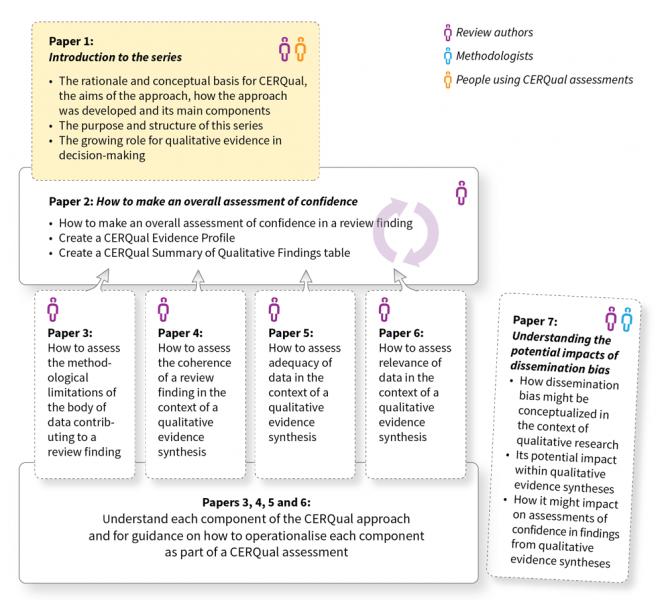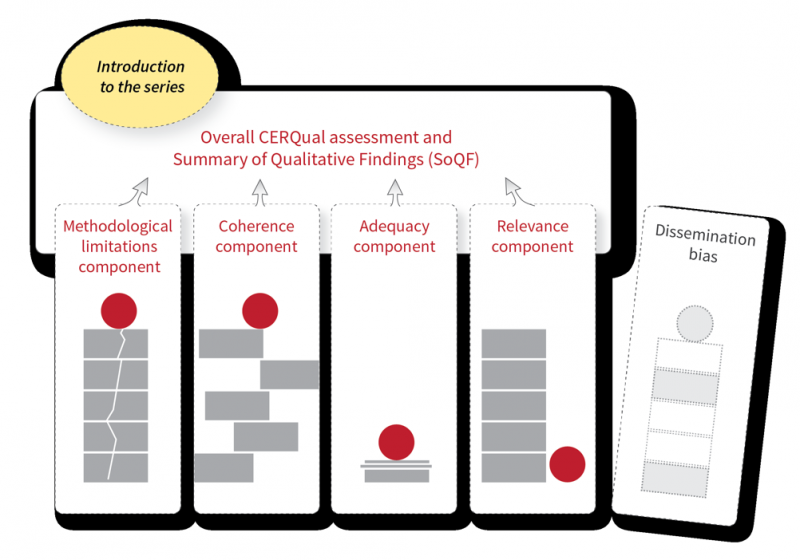A series of papers published in Implementation Science this week provides guidance on how to apply the GRADE-CERQual approach. CERQual helps assess how much confidence to place in findings from qualitative evidence syntheses. This work received support from Cochrane to ensure greater rigor in Cochrane Reviews including a Qualitative Evidence Synthesis component. Members of GRADE-CERQual and Cochrane support training events to actively disseminate this new approach and Cochrane members should look out for future training opportunities. This welcomed development ensures greater integrity of qualitative research findings and their interpretation for stakeholders of Cochrane Reviews.
Why is GRADE-CERQual important?
Findings from syntheses of qualitative research can help provide evidence on people's views of health and social care issues, about whether interventions are acceptable to the people affected by them, about the feasibility of interventions, and about a range of other factors that are likely to influence implementation. Such syntheses are being used increasingly to inform decisions about health and social policies. The GRADE-CERQual ('Confidence in the Evidence from Reviews of Qualitative research') approach helps decision makers use these syntheses by indicating how much confidence they should place in each finding.
The GRADE-CERQual approach is already being used in guidelines published by the World Health Organization (WHO), the National Institute for Health and Care Excellence in the UK, the Swedish Council on Health Technology Assessment and the European Commission Initiative on Breast Cancer. Susan L Norris, Secretary of the WHO Guidelines Review Committee, says: "The importance of qualitative data is increasingly recognized when producing recommendations in public health, as these recommendations must reflect far more than the balance of benefits and harms of an intervention as measured quantitatively. Data on acceptability and feasibility, for example, are invaluable when formulating recommendations and when adapting them to the local context. The CERQual approach has been vital in helping us to use qualitative evidence appropriately."
Series of seven papers
This series provides detailed guidance on how to apply the GRADE-CERQual approach. Paper 1 gives an overview of CERQual's rationale and conceptual basis, how the approach was developed, its aims, and its main components. Papers 3, 4, 5, 6 and 7 discuss each CERQual component, including how the component is conceptualized and how it should be assessed. Paper 2 discusses how to make an overall assessment of confidence in a review finding and how to create a Summary of Qualitative Findings table.
The series is intended primarily for those undertaking qualitative evidence syntheses or using their findings in decision-making processes, but is also relevant to guideline development agencies, primary qualitative researchers and implementation scientists and practitioners.
Co-author Simon Lewin, from the Norwegian Institute of Public Health and the South African Medical Research Council notes that "This series provides CERQual users with detailed information on how to apply the approach. CERQual is already helping decision makers across the world understand how much confidence to place in findings from qualitative evidence syntheses. This will help them use qualitative evidence more widely and appropriately." Co-author Heather Munthe-Kaas, adds: "In addition to its use in the field of health, qualitative research has a long tradition in the social care environment. Together with the rapidly increasing development of qualitative evidence synthesis methods, CERQual helps ensure that qualitative evidence is used appropriately in decisions about social care policy and practice."
Part of the international GRADE Working Group
CERQual has been developed by an international team of qualitative researchers, as a subgroup of the GRADE (Grading of Recommendations Assessment, Development, and Evaluation) Working Group (www.gradeworkinggroup.org), with funding from the Alliance for Health Policy and Systems Research, Cochrane, Norad, the Research Council of Norway and WHO. Co-author Claire Glenton notes: "We encourage those keen to support the further development of CERQual to join our subgroup via our website (www.cerqual.org)."
The GRADE-CERQual papers are freely available on the Implementation Science website at https://implementationscience.biomedcentral.com/articles/supplements/volume-13-supplement-1


